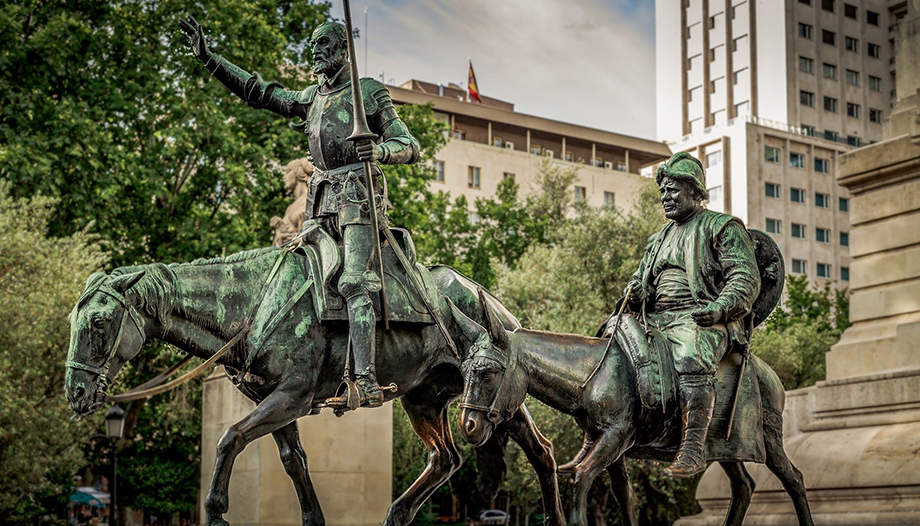"It is really impressive to see the influence that Cervantes' immortal work has had on universal literature. Almost everyone knows that it is the most important book written in Spanish and practically all relevant writers have pointed it out as essential reading for anyone who wants to enjoy an average culture.
Why? Without going into the indisputable literary quality of this great novel, we can say that it is a monument of Christian culture, whose ideals have not gone and can never go out of fashion. Even now, the work of the one-armed man of Lepanto can serve as an inspiration to face today's challenges."
I confess that I read Don Quixote for the first and only time so far the summer before I started my university studies.
I had heard my grandfather say that no one should enter university without having read the greatest work of Spanish literature, apparently the most widely read book after the Bible. It seems that the advice affected me and I read it that summer, without fully understanding it. I liked it, but I was not too impressed either.
Years later I have been meeting people who have specialized in the book and who have drawn consequences and ideas that I had not even glimpsed.
Almost no one fails to introduce a quote from Cervantes' text in his speeches and centuries after it came to light it continues to be edited and quoted and now I see that with good reason.
On the one hand, the ingenious nobleman of La Mancha and his faithful Sancho represent the soul of Spain and of Spaniards, of everyone, although at times they may seem contradictory and incompatible.
This magnificent combination of idealism and realism, of a taste for adventure and an appreciation for comfort and pleasures, masterfully portrays the best virtues and the worst vices of the people of our country.
On the other hand, the ideals of Don Quixote are those of Christianity, since Alonso de Quijano and also in his own way Sancho Panza are a representation of the Christian knight.
What is it if not what moves the famous man from La Mancha to leave the comfort of his armchair and his books to go and help others, getting into trouble and risking his honor and his life, without losing his sense of humor at the same time?
Miguel de Unamuno, one of the Spanish authors who has best dived into the depths of Cervantes' work, said that the countries that have best understood the message of the ingenious gentleman are England and Russia.
Daniel Dafoe, Jonathan Swift, Jane Austen, Lord Byron, Chesterton or Graham Green, among others, have been inspired by the adventures of the knight of the sad figure for their best works.
The great Russian authors have often been fascinated by the adventures of Don Quixote, perhaps because it is true that Spain and Russia have many common elements such as their strong religiosity and their passionate defense of ideals. Cervantes' creation is present in Pushkin, Gogol, Turgenev, Dostoyevsky and many other Russian geniuses.
Turgenev compared in a famous lecture the thoughtful and irresolute Hamlet with the thoughtless and arrogant Don Quixote, finding great nobility in both characters. But it is probably in Fyodor Dostoyevsky where the Manchego's influence is more profound. He talks a lot about him in his letters where he refers to the work of Cervantes as an essential piece of universal literature, one of those books "that gratify mankind once in a hundred years".
For Dostoyesvsky, Cervantes' novel is a conclusion about life. Such was his admiration that he imitated it in The Idiot, whose protagonist, Prince Mishkin, is an idealist reminiscent of the hero of La Mancha. Stripped of ridiculous heroism, he actually resembles the final character of Cervantes' work, Alonso Quijano, the good, who is mainly an imitator of Jesus Christ.
In America, Jorge Luis Borges had a relationship with fiction as complex as that of Miguel de Cervantes, as he read the work since he was a child and glossed it in essays and poems, even drawing inspiration from it to write the short story "Pierre Menard, author of Don Quixote". included in his anthology Ficciones.
Already in Spain, the great poet of the Spanish exile León Felipe fell in love with the figure of the nobleman from La Mancha and dedicated numerous poems to him, such as the famous "Vencidos". His are the verses: Put me on the rump with you/ Knight of honor/ Put me on the rump with you/ And take me to be with you, shepherd.
The German Romantics as well as great philosophers of the stature of Hegel or Schopenhauer have admired and made much of Cervantes' novel.
The list could be endless. For example, the Swiss theologian Hans Urs von Balthasar, in some memorable pages of his work Gloria, sees in the comicality of Don Quixote the Christian comicality and ridicule: "To undertake at every step, modestly, the impossible".
In short, it is clear that the ideals embodied by Don Alonso de Quijano are immortal and can therefore continue to inspire current generations at this particular moment in history.
Honesty, audacity, magnanimity, generosity, contempt for ridicule, taking one's own limitations with a sense of humor, are or can be very necessary virtues to continue trying to achieve a fairer and more humane world, which we need.
Ideals that may seem naïve, as the nobleman from La Mancha undoubtedly was, but which are precisely those that make life happier and more fruitful.









